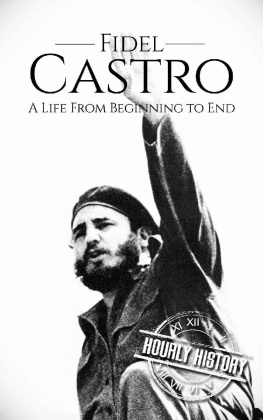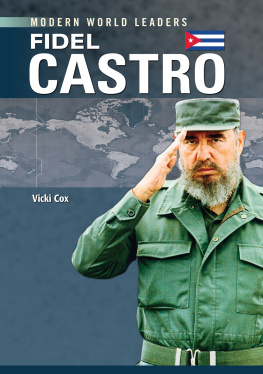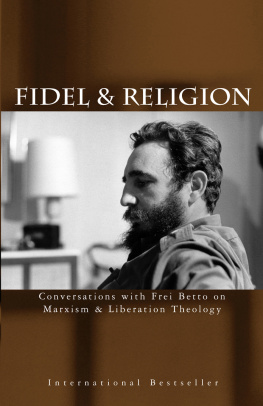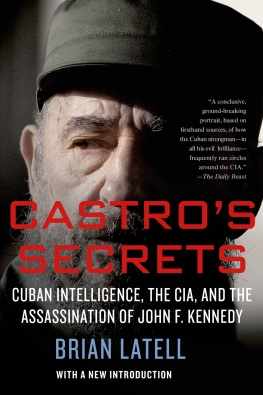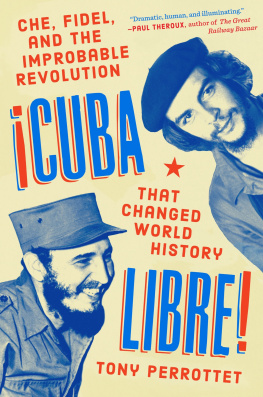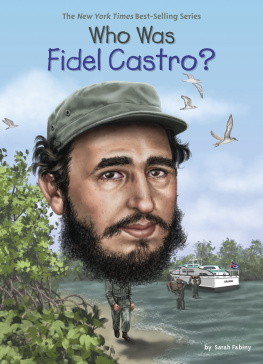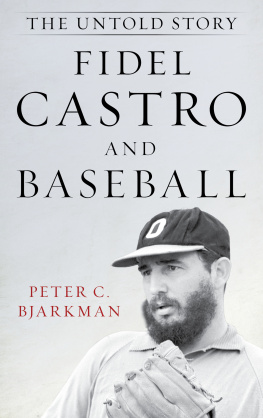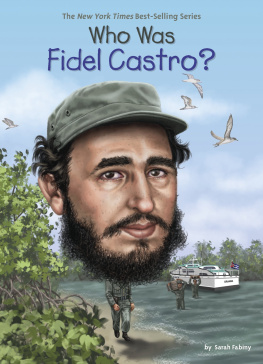
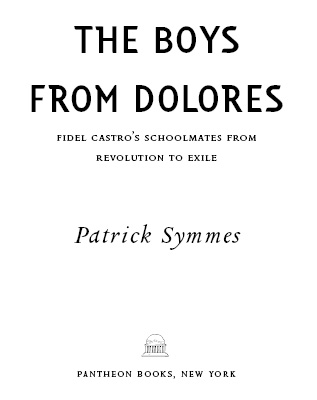
Contents
FOR MY MOTHER,
WHO ENCOURAGED ALL MY VENTURES, GREAT OR SMALL
I want to leave today for the island of Cuba, which I believe to be JapanThe Indianssay it is very large and has people there with one eye in the forehead, as well as others they call cannibalsI also understand that, a long distance from here, there are men with one eye and others with dogs snouts who eat men.
FROM THE LOGBOOK OF CHRISTOPHER COLUMBUS
MIAMI SPRINGS
This has been a difficult year for the Sad Ones, Pedro Haber said, but before he could continue, there was a metallic purr, which grew quickly into a feedback loop. The sound squawked over the ballroom, a room full of wrinkled men in brown suits and ageless women in immovable bouffants. Pedro tried to continue. He said, Four who regularly attend these reunions have fallen, God has them in all his glor
But he was cut off now, fatally. The screech made even a busboy put down his bread rolls and cover his ears. A devilish skeeeeeeeTWAAAAAAAAA-weeeeeeSKEEEEE refracted off the rented glassware and the golf club plates, a piercing white noise like a fax machine in your head. Old, trembling hands rose reaching for hearing aids.
Pedro, class of 59, stood calmly and stared at the microphone. One more betrayal in a lifetime of disappointments.
SKWEEEEEEEEEE-BWAAAAAAAAAA-SOOOOOOOOOO.
Pedro ran the reunions because he was the most stalwart, reliable, and capable of the men from the old days. But this was exactly why he disliked being called on to manage things, yet again. He was a friend to everyone. He did nothing to deserve this. Stress was bad for a man his age. But duty was duty: at sixty-two years of age, he was one of the younger men in the room.
Unplug. Fiddle with knobs. Move cables. Start over. Forget to replug. Replug. Readjust knobs. Tap tap. Can everyone hear me? He was back in business. But nobody, all night, could handle the microphone. Not even the singer.
Pedro Haber didnt actually start by saying that it was a difficult year for the Sad Ones. He had said that it was a difficult year for the Dolorinos. The word is rooted in dolor, meaning pain, ache; sadness, grief. When Pedro said Los Dolorinos it sounded like all of those things, a world of aching and grieving, the ones who suffer. But it had another meaning, for these were the men who, as boys, came from a happy place. Dolores was their old school, the Catholic academy, run by Jesuits. The Colegio de Dolores where they had all met had been a boarding school in eastern Cuba, once upon a time. The sadness had come later.
Everyone in the room, from the busboys on up, spoke the twin languages of this nation-within-a-nation. But not everyone is equally ambidextrous, and thought and speech leapt between Cuba and the United States. At the far right of the room, near the entrance, was a special table reserved for VIPs and the guests of honor. Pedro Haber and I were sitting there, and the accents and vocabulary at this table were a mixture of proper upper-crust Castilian Spanish and plain American English. Two spots over to my right was Pedro Roig, a Dolores alumnus and Bay of Pigs veteran, who was now head of TV Mart in Washington. Immediately on my left was Lundy Aguilar, retired from his professorship at Georgetown University. And directly across the table was the Reverend Father Juan Manuel Dorta-Duque, one of the last surviving teachers from the old school in Cuba. He was a Jesuit, or more properly, a member of the Society of Jesus, perhaps the most influential of all Catholic orders. Dorta-Duque was eighty-four years old now, but that wasnt old enough to have known Fidel Castro. Dorta-Duque told me that he didnt arrive at Dolores until 1951. But he had known all the Jesuits who had taught Fidel, as well as some of the younger boys from those days, or the younger brothers of the boys who had studied with Fidel. Dorta-Duque lived in a Jesuit home now, retired from all work but that of joining his fellow Jesuits in their duties of worship and contemplation.
Yes, I remember them, Dorta-Duque said, leaning forward. He meant that he remembered the students and teachers from long before the Revolution, when the future of the country was in the hallways of Dolores. But they are all dead, he added.
One of them was sitting at the same table, actually. A survivor, just a few feet away. But Lundy Aguilar didnt hear the remark, and Dorta-Duques mistake did no harm.
Two languages, two minds, a Cuban inside every American. Even here, at their own high school reunion, among their very own, they were unmoored, their homes, lives, even their manner of speech, somehow without footing.
Cuban exiles are on a journey that cannot be finished in one lifetime, a two-hundred-mile transmigration of the soul that is at once irreversible, and incompletable. The survivor suffers from temporal confusion, at once in eastern Cuba in 1941 and in Miami Springs in 2005. Equally at home in that lost Atlantis, the mythical Cuba from before, and in the Dade County real estate market. What a difference between the old Santiago de Cuba, in the long-ago republic, in a time of youth, privilege, and revolution, and this age of old faces at a golf club near Miami International? Werent these the same people? Like a snail, the exile carried his world along with him.
The phrase Los Dolorinos harked back to a starting point, before any expulsion from any garden. The Colegio de Dolores was the capital school of Cubas second city, the best education available in eastern Cuba. The richest gathering of the richest part of Cuba, a school of the chosen few. All Pedro Haber had meant, what he truly said, was that they, the Dolorinos, had lost yet more friends. Four had fallen from the ranks this year. For this room of Cuban exiles, locked in an actuarial competition with Fidel Castro himself, attrition was a difficult subject.
The reunion was held in late September, the middle of a very bad hurricane season. There had been eleven inches of rain in a month. The water table was up to the grass. It had rained again this morning, hard. Low clouds, lit up by the ground beacons of Miami International, by the strip malls along Le Jeune, and by the floodlights of an industrial park across the road, scudded over the golf course. Turbulent and wet, the clouds passed without releasing drops, for now. Black patches of night sky winked in and out.
The old Dolorinos and their wives had started arriving en masse at 7:00 P.M. , most of them not just on time for the cocktail hour, but early. Over the next hour heavy American cars kept rolling into the lot, and then the same progression of aged legs crossed the street. The grass lawn of the country club would hiss as someone explored the possibility of taking a shortcut. A dress shoe came back out of the grass with a sucking sound, and a high heel stabbed an indentation in the lawn that began to fill with runnels of silt. The click of heels on brick soon followed. These men and women, averaging somewhere in their early sixties, cut no corners. Moving slowly, often supporting each other, they made right-angle turns on the brick walkways, which were uneven and slicked with algae. The men, in a mixture of brown and black suits, or sometimes the long-sleeved guayaberas, were jovial, even the one who arrived using a walker. The women had formality and reserve. (It wasnt their reunion; Dolores was a boys school.) Or maybe the women had, in their upright carriage, just the composure required by cream gowns and structured black cocktail dresses, by shoulder wraps of the very gauziest pastels. Their hair was stiff. Usually short, a tropical reality, but fixed in uplifted constructions. Their lips and eyelashes were lacquered with precision. Even on the men, every hair was in placebrushed back, Brylcreemed, ordered and clipped. You had to draw the line somewhere and this was it: neatness of tonsure was a way of fighting back, of defending civilization against its enemies.
Next page

